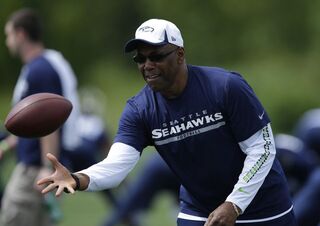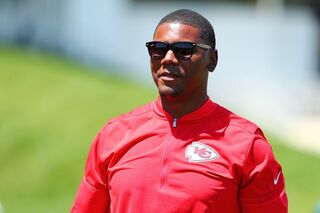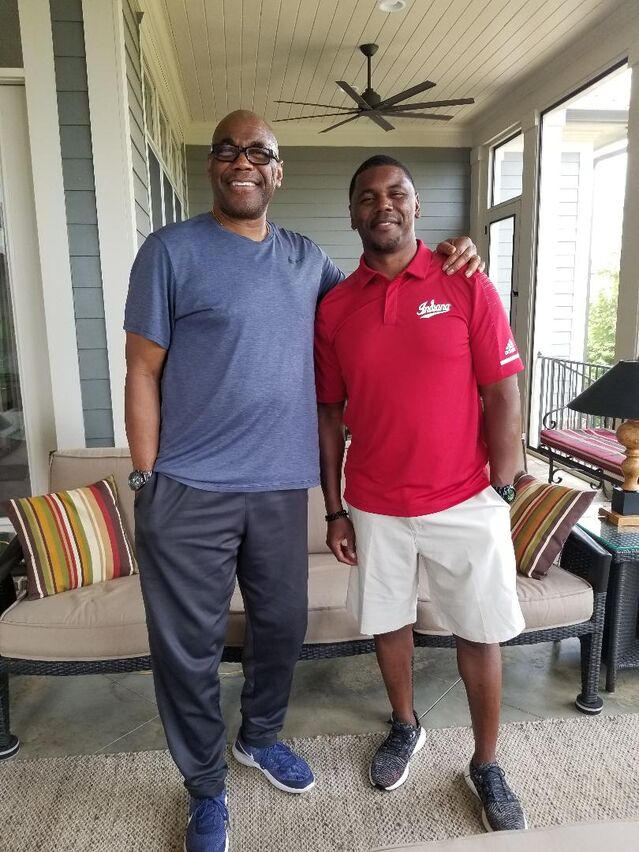Coaching
Focus on People and Process for a Winning Team
How commitment to the growth of athletes as people leads to coaching success.
Posted October 12, 2021 Reviewed by Vanessa Lancaster
“A good process produces good results,” said Nick Saban, University of Alabama head football coach, a guy well-acquainted with good results.
The growth of people as a process--not an obsessive focus on winning--is what leads to the result of victory and championships, according to Sherman Smith and Deland McCullough, an accomplished father-son duo with a combined 25 years of National Football League coaching experience, including five trips to the Super Bowl.

Smith served as running backs coach with the Houston Oilers/Tennessee Titans, Washington Football Team, and Seattle Seahawks before retiring in 2017. McCullough spent three years as running backs coach with the Kansas City Chiefs before assuming associate head coaching duties at Indiana University this season. The twosome has coached the likes of Marshawn Lynch, Eddie George, Kareem Hunt, and LeSean McCoy.

Smith and McCullough’s improbable father-son story is detailed in the previous “Sports-Between-the Ears” installment in Football Family Crucible. While not quite as astonishing as that story, the similarity of their coaching philosophies is surprising—even to them.
Whether you’re a coach, teacher, parent, mentor, or leader, please read on to absorb some inspiring father-son coaching wisdom—and process.
Commitment to People Development
“Relationships are BIG,” explained McCullough. “I do everything I can to cultivate them. I like to see the growth of guys.”
The retired Smith agreed in a separate interview. “I care about them (players) more than that they play football. I’m interested in their development as young men. That will impact how they do on the field, how they do as a father.”
What, exactly, goes into the cultivation of effective relationships that allow coaches to maximize the growth of their people and ensures their coaching success? Let’s look at some key points made by Smith and McCullough.
Genuineness, Humility, Trust, and Relationships
“People pick up on genuineness,” McCullough shared. “It’s like my dad (Smith) says, you’ve got to be who you really are. To me, it’s just how you communicate, how you listen, and how you respond. Genuineness builds trust, and that leads to solid relationships.”
“The thing I do to build trust is to make myself vulnerable,” Smith explained.
I tell the good, bad, and ugly about my own life, my own experiences, so that they know that I’m not talking to them like a guy that’s never made any mistakes.
A lot of the best talks that I have had with my guys is right before we have a meeting, Smith continued. I’ll walk in, and the guys are talking about something, and they let me become part of the conversation. It could be about dating girls, it could be all about A to Z, and they’ll say 'Coach Sherm, what’s your thoughts, what do you think?’
That’s what helped me develop trust in my players, other coaches, and people When I can look at them and let them see ‘hey, this guy (Smith) is not perfect, he’s desiring to be a better husband, a better father, a better coach, and he shares his mistakes. He’s showing his humility and his desire to be a better man.’ That fosters trust. ‘I trust this this guy and I can open up to him.’
If you get around a guy who never makes a mistake, and he’s always in judgement of what somebody else did—didn’t do the right thing, made a mistake—I’m not going to talk to that person because I don’t think he can relate.
McCullough shared a similar approach.
With the guys, I find a level of relationship with stories. Guys like to hear stories I tell, and I’ve got stories to match up to about anything. I’m big on telling a story about when I played, or stuff when I was a teacher or principal (at a school).
I think what it does is it lowers, it gives me more relatability with the guys, I tell them ‘Hey, you won’t believe the crazy thing I did when I was a senior in high school or my sophomore year in college.’ They see ‘hey, he’s a regular guy, he ain’t coming in here with a holier than thou, ‘shut up, I’m the coach and I’ve got all the answers, I’m the smartest guy, the most perfect guy.’ No, he comes in here and has a level of relatability, he talks to us on our terms. I respect this guy.’ It’s not built on ‘be quiet, I’m the coach, just do what I say, and that’s it.’
That “holier than thou” arrogant attitude can be a complete turnoff to those being coached, taught, or parented.
When I shared that Smith made identical points about vulnerability, McCullough exclaimed, “WOW! It’s ironic that you’re saying that because we never discussed things like this.” Will the surprises connecting McCullough and his dad never cease?
Here are a few more coaching parallels between the two.
The Power of Respect
“The power of respect is to never disrespect,” Smith advised.
How many times have you witnessed a coach going off in a rage after an athlete’s mistake? It’s an embarrassment to the coach and an inexcusable humiliation—and distraction—for the athlete.
“There’s a very thin line between correcting a guy and disrespecting a guy in the process of correcting him,” explained Smith.
What is the goal of the discipline? Am I trying to let ‘em know I’m mad or am I trying to correct their behavior? It’s not to make you angry, it’s to make you better.
When you step over the line—a personal insult, you called him a name, you do something physical like grabbing his face mask—you’ve attacked their character, instead of what they did. I try to think about something before I say it. That doesn’t mean I didn’t get after a guy, but it means I didn’t disrespect him.
Coaching tantrums disrespect athletes and do not improve them. It’s an impulsive discharge of anger that displays a lack of self-discipline. It’s often the same coach who continuously lectures his team about their bad body language—a ridiculous irony.
McCullough is on the same wavelength. He stated,
I’m never gonna put a guy down. I’m just gonna say we’ve got some stuff to work on. I’ll correct it: ‘hey, look, you need to get your hands up’. I just don’t do it with a high (angry) tone. I never really understood that. I’ve never felt like I need to start cursing guys out. The thing I pride myself with is that nobody walks away from an encounter we had—especially if they had an error—feeling less of a person.
When I shared that Smith also said none of his players ever walked away feeling disrespected, McCullough laughed and uttered another “Wow!”
The Why
“You’ve gotta have the why for what you do, a conviction,” Smith enthused.
It (coaching) is a conviction to me, it’s a calling. It’s like I told Eddie George when he got the head coaching job at Tennessee State University. I told him you got to learn what your why is. There’s a difference between a belief and a conviction. A belief is something that you hold, a conviction is something that holds you.
I just believe God was calling on my life to be a coach. The coaching Gods showed me the why to coach; to make a difference, to have an impact on these guys’ lives. When you have the why it’s not just what you do, it’s who you are. It’s your identity.
Smith is an intensely spiritual soul. Faith also plays a role for McCullough. He explained,
It (faith) is a big part of my life, but not to the same level as my dad. It’s important, I definitely don’t downplay it by any stretch, but my dad is a highly spiritual person.
McCullough echoed one aspect of Dad Smith’s why, “when he said,
I like to see the growth of guys. When you do all I’ve been saying, you create highly competitive guys accountable to each other, guys who have something to prove, guys who want to earn a high level of respect. You’re going to win games.
Explaining the Father-Son Likeness

How did McCullough end up so much like his father? McCullough insisted,
It was totally unintentional, it’s just who I am. I don’t truly believe I emulated him. My dad coached me for one season (at Miami University). It wasn’t like I got to study him for five years or something. When I suggested that the likeness could be genetic, a guy—Spencer Ware—who my dad coached in Seattle, and I coached in Kansas City said, ‘you guys coach the same.’
Another irony in this improbable father-son coaching legacy.




